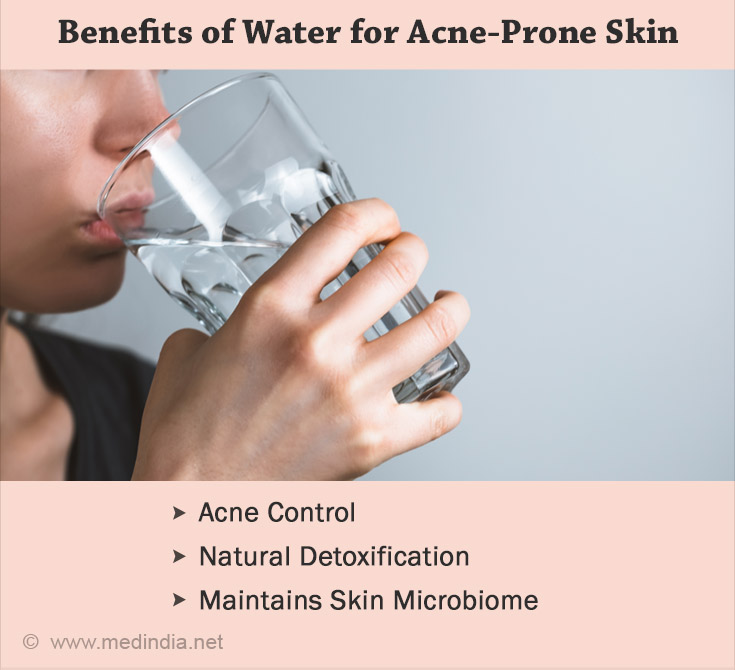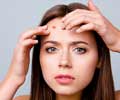- Acne Vulgaris - (https://www.ncbi.nlm.nih.gov/books/NBK459173/)
- Acne: Overview - (https://www.ncbi.nlm.nih.gov/books/NBK279211/)
- Nutrition and water: drinking eight glasses of water a day ensures proper skin hydration-myth or reality? - (https://pubmed.ncbi.nlm.nih.gov/20620753/)
- Dietary water affects human skin hydration and biomechanics - (https://www.ncbi.nlm.nih.gov/pmc/articles/PMC4529263/)
- Does dietary fluid intake affect skin hydration in healthy humans? A systematic literature review - (https://pubmed.ncbi.nlm.nih.gov/29392767/)
- Organ Systems Detoxification - (https://vetmed.tamu.edu/peer/detoxification/)
- Reduced water intake deteriorates glucose regulation in patients with type 2 diabetes - (https://pubmed.ncbi.nlm.nih.gov/28739050/)
- Dietary water affects human skin hydration and biomechanics - (https://www.ncbi.nlm.nih.gov/pmc/articles/PMC4529263/)
- The Therapeutic Effects of Nigella sativa on Skin Disease: A Systematic Review and Meta-Analysis of Randomized Controlled Trials - (https://pubmed.ncbi.nlm.nih.gov/36518853/)
- How much water should you drink? - (https://www.health.harvard.edu/staying-healthy/how-much-water-should-you-drink)
About
Acne is a common skin condition that does not always disappear after the teenage years. People often try various approaches to get clearer skin, and one simple yet powerful aspect is often overlooked: drinking water. But does water help with reducing acne? Let's look into the connection between acne and drinking water, highlighting how this basic practice can significantly contribute to achieving healthier, blemish-free skin. Let's explore how staying well-hydrated can make a real difference in transforming your skin.
What is Acne?
Acne is a common skin condition characterized by the occurrence of pimples, blackheads, whiteheads, and, in severe cases, cysts. It often arises due to the blockage and inflammation of hair follicles and their associated sebaceous glands(1✔ ✔Trusted Source
Acne Vulgaris
Go to source). Acne is not solely a cosmetic concern; it can affect one's emotional well-being and self-esteem.
What are the Types of Acne?
Non-inflammatory Acne:
- Blackheads and Whiteheads: These are mild forms of acne caused by clogged hair follicles.
Inflammatory Acne:
- Papules and Pustules: Red, swollen, and often painful lesions.
- Nodules and Cysts: Deeper, more severe forms of acne that can lead to scarring(2✔ ✔Trusted Source
Acne: Overview
Go to source).
Does Drinking Water Help with Acne?
Acne, characterized by pore-clogging oil and dead skin cells, finds an adversary in well-hydrated skin. Dry skin tends to produce more oil, creating a conducive environment for clogged pores. The connection between drinking water and acne has been a subject of debate. While water is essential for overall health, its direct impact on acne prevention and control is multifaceted(3✔ ✔Trusted Source
Nutrition and water: drinking eight glasses of water a day ensures proper skin hydration-myth or reality?
Go to source).
Skin Hydration
Adequate water intake contributes to skin hydration, promoting a healthier complexion. Hydrated skin is less prone to excessive oil production, which is a common factor in acne development(4✔ ✔Trusted Source
Dietary water affects human skin hydration and biomechanics
Go to source). Scientific studies underscore the significance of hydration, revealing that an additional water intake significantly improves skin hydration(5✔ ✔Trusted Source
Does dietary fluid intake affect skin hydration in healthy humans? A systematic literature review
Go to source).
Bacterial Acne
Contrary to the claims of detox fads, the body boasts its internal detoxification mechanisms through the liver, kidneys, and skin(6✔ ✔Trusted Source
Organ Systems Detoxification
Go to source). Sufficient water intake acts as a conduit for nutrient transport, facilitating the flushing out of toxins and naturally occurring heavy metals. This internal detoxification process underscores water's significance in maintaining a clean slate for skin health. Proper hydration supports the body's natural detoxification processes, potentially reducing the proliferation of acne-causing bacteria like Cutibacterium acnes.
Benefits of Water for Acne-Prone Skin
Acne Control:
Water helps flush out toxins, supporting the management of acne.Blood Sugar Regulation:
Staying hydrated aids in maintaining stable blood sugar levels(7✔ ✔Trusted SourceReduced water intake deteriorates glucose regulation in patients with type 2 diabetes
Go to source), potentially influencing hormonal acne.
Drinking Water and Cystic Acne:
Cystic acne, a severe form, may benefit from adequate water intake. While it's not a cure, hydration supports overall skin health and healing(8✔ ✔Trusted SourceDietary water affects human skin hydration and biomechanics
Go to source).
Drinking Jeera Water and Acne:
Some advocate for cumin (jeera) water's potential benefits in managing acne(9✔ ✔Trusted SourceThe Therapeutic Effects of Nigella sativa on Skin Disease: A Systematic Review and Meta-Analysis of Randomized Controlled Trials
Go to source). While research is limited, incorporating herbal infusions can contribute to overall hydration.
Natural Detoxification:
Water is essential for natural detoxification processes, assisting in the removal of impurities that may contribute to acne.Skin Purging:
Increased water consumption can trigger a temporary skin purging process as the body eliminates toxins. This might initially appear as an exacerbation of acne, but it is a natural part of the detoxification process.Boosts the Immune System and Nurturs the Skin Microbiome:
Hydration supports the immune system, a critical defender against infections and acne triggers. A robust immune system contributes to a resilient skin microbiome, fortifying the body's defenses against acne-causing bacteria. The interconnectedness of hydration, immunity, and a balanced microbiome emphasizes water's pivotal role in holistic skin health(10✔ ✔Trusted SourceHow much water should you drink?
Go to source).

While drinking water is essential for overall health and may contribute to clearer skin, it's not a standalone solution for acne. A holistic approach, including proper skin care, a balanced diet, and professional guidance, is crucial for effective acne prevention and management. Individual responses may vary, so it's advisable to consult with a dermatologist for personalized recommendations.
For those grappling with persistent acne, it may be a symptom of underlying health conditions, such as hormonal imbalances or infections. Seeking guidance from a healthcare professional who considers overall health is crucial. A comprehensive approach that addresses internal health can complement external skincare routines, fostering a holistic path to clearer skin.
How to Determine Optimal Water Intake?
The ideal amount of water varies based on factors such as weight, activity level, and medications. A practical guideline involves dividing your weight by two to determine your daily water intake in ounces. Consulting with a healthcare provider, especially for those on prescription medications, ensures a tailored approach to hydration. Recognizing daily hydration cycles, such as morning dehydration, is essential for optimizing water intake.
In summary, the correlation between hydration and acne reveals the profound impact of water on skin health. Beyond a simple recommendation, staying well-hydrated emerges as a foundational element in the multifaceted journey to combat acne. By acknowledging the intricate interplay between hydration, immunity, and detoxification, individuals can empower themselves to achieve lasting clarity and vitality in their skin.












